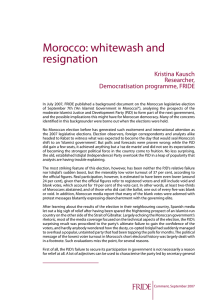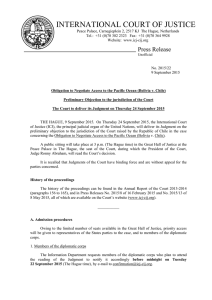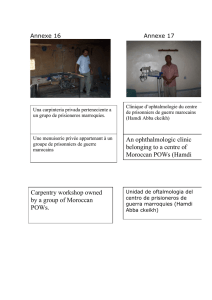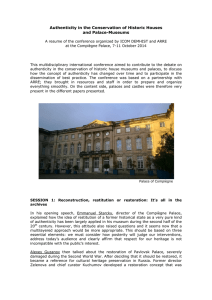First Year of Islamist Government in Morocco: Same Old
Anuncio
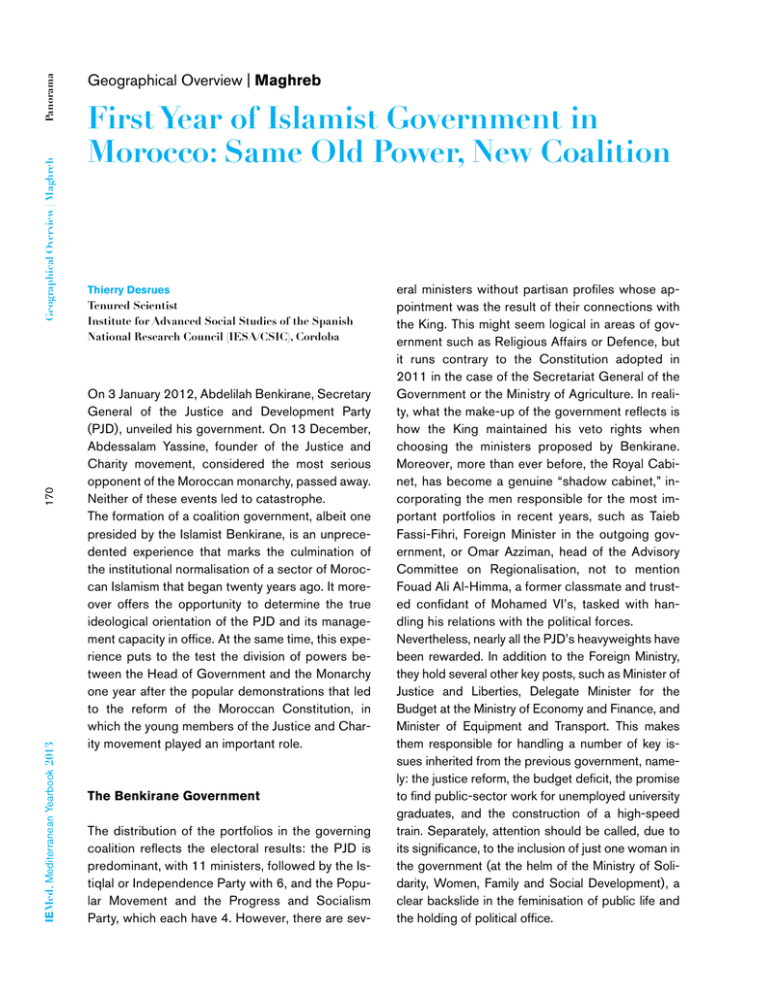
Panorama Geographical Overview | Maghreb 170 IEMed. Mediterranean Yearbook 2013 Geographical Overview | Maghreb First Year of Islamist Government in Morocco: Same Old Power, New Coalition Thierry Desrues Tenured Scientist Institute for Advanced Social Studies of the Spanish National Research Council (IESA/CSIC), Cordoba On 3 January 2012, Abdelilah Benkirane, Secretary General of the Justice and Development Party (PJD), unveiled his government. On 13 December, Abdessalam Yassine, founder of the Justice and Charity movement, considered the most serious opponent of the Moroccan monarchy, passed away. Neither of these events led to catastrophe. The formation of a coalition government, albeit one presided by the Islamist Benkirane, is an unprecedented experience that marks the culmination of the institutional normalisation of a sector of Moroccan Islamism that began twenty years ago. It moreover offers the opportunity to determine the true ideological orientation of the PJD and its management capacity in office. At the same time, this experience puts to the test the division of powers between the Head of Government and the Monarchy one year after the popular demonstrations that led to the reform of the Moroccan Constitution, in which the young members of the Justice and Charity movement played an important role. The Benkirane Government The distribution of the portfolios in the governing coalition reflects the electoral results: the PJD is predominant, with 11 ministers, followed by the Istiqlal or Independence Party with 6, and the Popular Movement and the Progress and Socialism Party, which each have 4. However, there are sev- eral ministers without partisan profiles whose appointment was the result of their connections with the King. This might seem logical in areas of government such as Religious Affairs or Defence, but it runs contrary to the Constitution adopted in 2011 in the case of the Secretariat General of the Government or the Ministry of Agriculture. In reality, what the make-up of the government reflects is how the King maintained his veto rights when choosing the ministers proposed by Benkirane. Moreover, more than ever before, the Royal Cabinet, has become a genuine “shadow cabinet,” incorporating the men responsible for the most important portfolios in recent years, such as Taieb Fassi-Fihri, Foreign Minister in the outgoing government, or Omar Azziman, head of the Advisory Committee on Regionalisation, not to mention Fouad Ali Al-Himma, a former classmate and trusted confidant of Mohamed VI’s, tasked with handling his relations with the political forces. Nevertheless, nearly all the PJD’s heavyweights have been rewarded. In addition to the Foreign Ministry, they hold several other key posts, such as Minister of Justice and Liberties, Delegate Minister for the Budget at the Ministry of Economy and Finance, and Minister of Equipment and Transport. This makes them responsible for handling a number of key issues inherited from the previous government, namely: the justice reform, the budget deficit, the promise to find public-sector work for unemployed university graduates, and the construction of a high-speed train. Separately, attention should be called, due to its significance, to the inclusion of just one woman in the government (at the helm of the Ministry of Solidarity, Women, Family and Social Development), a clear backslide in the feminisation of public life and the holding of political office. The legislative inactivity in this regard should not be interpreted as general legislative lethargy, but rather as the result, depending on the case, of a lack of will or a political inability to tackle core issues related to the development of the new Constitution. In fact, over this period, the government has produced some sixty laws, often related to international conventions and treaties, and has undertaken a series of initiatives to denounce what might be described as “rent situations.” Indeed, the Islamists have trained their sights on two areas: civil servants and people with licences to carry out activities in certain state-controlled economic sectors. Thus, lists have been published of people with licences to transport passengers or operate aggregate quarries, people who are given public accommodations by some ministries, and even the names of the associations receiving public aid from abroad. Likewise, the National Education Ministry’s teaching staff and the Health Ministry’s medical staff have been barred from working at private establishments, and it has been agreed that positions in the civil service will only be awarded by competitive exam. Moreover, it has been established that, as provided for by law, wage withholdings will apply to civil servants on strike, which has raised union hackles. Faced with this less than stellar list of legislative accomplishments, the government defends its performance arguing that it has also increased the Panorama Geographical Overview | Maghreb The make-up of the government reflects how the King maintained his veto rights when choosing the ministers proposed by Benkirane 171 The actions of the Benkirane Government have primarily been conditioned by the need to prepare the organic laws specifying the implementation of the 2011 Constitution. This has been its main challenge. However, of the 16 organic laws and 20 ordinary laws promised, only the text regarding the appointments of senior officials in the public administration and state companies has been enacted. minimum retirement pensions, expanded the health insurance system, lowered the prices of certain drugs, implemented a family solidarity fund and a social cohesion fund, and announced new taxes on large fortunes. To be fair, the Benkirane government has had to deal with public finances deteriorated by the measures taken to neutralise the first outbreaks of the Moroccan Spring, the crisis in Europe and a lacklustre year for crops. With the increase in oil prices and the announcement of a new fund for the poorest households, some have seen signs of a forthcoming reform of the subsidies to basic staples that so many have called for, but that no one has dared to undertake for fear of the social instability it might cause. The solution to this critical financial situation lay, once again, in royal diplomacy and requests for aid from Western allies (France and the United States) and the Persian Gulf monarchies (United Arab Emirates and Saudi Arabia), as well as different loans from international financial organisations such as the IMF, the World Bank, the African Development Bank, the European Investment Bank and the Arab Monetary Fund. While improving the public finances, putting the public sector to work and denouncing certain privileged situations are all positive actions taken by the Benkirane government, this same government and, in particular, some of the ministers from Benkirane’s own party, have become embroiled in multiple controversies involving accusations of Islamic fundamentalism, of a lack of respect for the pluralism of Moroccan society, and of insensitivity to social problems related to women’s rights and civil liberties. To this end, attention should be called to the draft reform of the Moroccan audiovisual sector submitted by the Minister of Communication, Mustapha El Khalfi, which proposed broadcasting all calls to prayer, Arabising the programming, and pushing back news broadcasts in French and Spanish until late at night. Given the mobilisation of the proponents of French-language programming, the King convened the Minister and the Head of Government for a consultation and tasked a committee he had appointed himself with the reform. Likewise controversial were the tone-deaf reactions of both the Minister of Justice and Liberties and the Minister of Solidarity, Women, Family & IEMed. Mediterranean Yearbook 2013 Government Action Panorama Geographical Overview | Maghreb 172 IEMed. Mediterranean Yearbook 2013 Social Development to the social outpourings resulting from the suicide of a teenager wed against her will to her alleged rapist. Under Article 475 of the Moroccan Criminal Code, the marriage between an alleged rapist and his victim makes it possible to safeguard the honour of the victim’s family while at the same time absolving the rapist of any legal action. The social mobilisation to abolish this article coincided with the visit of Minister of Justice Mustafa Ramid to the Salafi Sheikh Mohammed Maghraoui, back from a “forced” exile in Saudi Arabia for having recently authorised the marriage of a nine-year-old girl to an adult. With regard to the balance of power between the government and the Palace, it is worth noting several initiatives taken by the King that clearly show he has no intention of ceasing to intervene whenever he sees fit or of relinquishing certain prerogatives. In some cases, his interventions are reactive, correcting or modifying the government’s action, as in the reform of the television network programming. In others, it is proactive and does not seem to take the opinion of the Head of Government or the relevant Minister into account, such as with the appointment of the President of the Court of Auditors or the members of the Justice Reform Committee. The message hidden behind these initiatives and snubs is not easy to decipher; however, at the very least they highlight the imbalance of power between the Palace and the Head of Government. Benkirane does not dare to criticise the King; however, he does criticise his advisors, even when he is later forced to retract his words and reiterate his “loyalty” to the sovereign. The Head of Government makes up for this impotence with an active communication policy that contrasts with the silence of his predecessors. Populist rhetoric allows him to convey his displeasure, the constraints he faces, and the failure to re-balance power with the Palace in an effort to address his voters’ frustrated expectations for change. However, in the field of populism, the competition is fierce. In the religious terrain, he faces competition from Salafi currents and the Justice and Charity movement. With the death of Sheikh Yassine, the staunchest advocate of a path of dissidence with the regime and an alternative to the PJD’s strategy of integration has disappeared. The movement may be weakened by the loss of its elderly and charis- matic leader if the alleged tensions at its core between proponents of a Sufi approach and advocates of entering the political game prove to be real. Meanwhile, the PJD caters to Salafist leaders so as to ensure their support, despite growing rumours of the creation of a separate party to represent this current. With regard to the balance of power between the government and the Palace, it is worth noting several initiatives taken by the King that clearly show he has no intention of ceasing to intervene whenever he sees fit In the sphere of official political microcosms, the election, not free of controversy, of Hamid Chabat to head Istiqlal and of Driss Lachgar to head the Socialist Union of Popular Forces (USFP) promises a media frenzy that will contribute to the image of a plural and active political life in Moroccan society. In them, Benkirane will face a dual opposition: within his own government, Chabat, who has his eye on the premiership, has called for changes in the composition of the government, while Lachgar claims to be the leading opponent of the Islamists and has called for the reunification of the forces on the left. A Recurring Response on the Social and Political Front Throughout the year, several cities have seen seem­ ingly small and innocuous gatherings (the eviction of a family in Tangiers) or protests against the high cost of living (in Taza) end in violent confrontations with the security forces and harsh prison sentences. This repression has also affected the 20 February Movement, which, despite having lost much of its capacity to draw people out onto the streets, continues to denounce symbols of despotism, inequality and the lack of certain freedoms (ceremony of fealty to the King, the budget approved for the Palace) through social media and at one-off events. For those who expected a true break with the past, the results of the first year of the Benkirane government can only be described as poor. The reasons for this are divided between those who blame the Palace’s efforts to undermine it, those who attribute it to the party’s lack of governing experience, those who see governmental incompetence, and those who insist it is due to the funda- Panorama Geographical Overview | Maghreb mentalist foundations of the party’s agenda. The controversies that have arisen over the year have spotlighted the difficulties the government has encountered and revealed the impatience of its social base. These controversies, along with the ever-challenging issue of renewing the leadership of the political parties, have helped to project the image of an active democratic life, when, in reality, the truly important portfolios remain under the Palace’s control and show no signs of changing. In short, it seems that the Palace has learned to tolerate the religious populism of the PJD so long as the PJD is functional and acts as a retaining wall against the popular discontent that Morocco’s current social and economic climate continues to cause. 173 Conclusions The Palace has learned to tolerate the religious populism of the PJD so long as the PJD is functional and acts as a retaining wall against the popular discontent that Morocco’s current social and economic climate continues to cause IEMed. Mediterranean Yearbook 2013 Meanwhile, the Minister of Justice and Freedom, who was one of the most fervent defenders of the Salafists detained in relation to the 16 May 2003 terrorist attacks, today denies the existence of political prisoners and does not bat an eye when confronted with abuses against the press. Within this context, the publication of several reports denouncing human rights violations, the use of torture, and the climate of fear in the Western Sahara has further chipped away at the government’s credibility. Likewise, the delay in implementing the regionalisation plan and the failed attempt to separate Christopher Ross as the UN Secretary General’s special envoy have undermined the credibility of the solution of an autonomous Sahara under Moroccan sovereignty.
